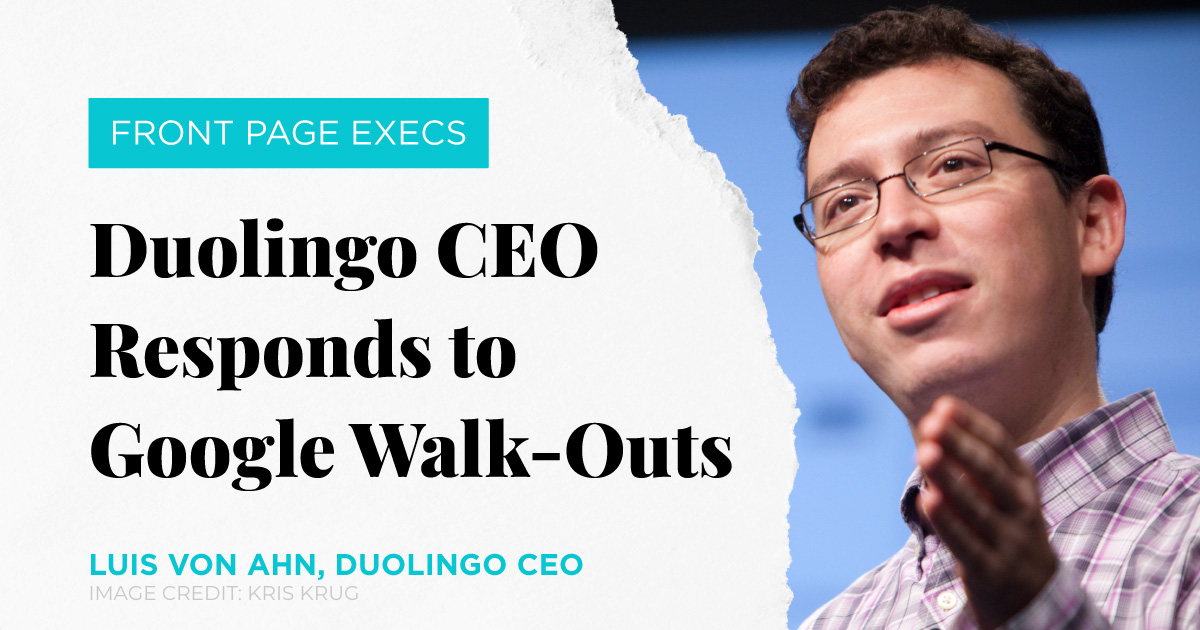Two weeks ago, Google employees around the world took part in a walkout to protest Google’s mishandling of sexual harassment cases. As a result, Google pledged to overhaul its sexual harassment policy. The protest also sparked an international conversation about the technology industry’s relationship with diversity and gender inequality as a whole. One prominent participant in the conversation at this time was Luis von Ahn, CEO and co-founder of language-learning app Duolingo. In this edition of Front Page Execs, Influential Executive will be examining what von Ahn did right, why he did it, and what he should have avoided when engaging in this conversation.
Now, which side of the conversation was von Ahn supporting? Let’s take a quick look at his company to answer that question. Duolingo frequently asserts that, as a company, its goal is to provide equal access to education, which is why the app is free. By its very nature of teaching different languages to people all over the world, the company also inherently supports the improvement of cross-cultural communication and diversity. Therefore, promoting positive social change and diversity is a natural topic for the company and, by extension, its CEO, to voice opinions about.
Therefore, it came as no surprise to us when von Ahn took the Google walkouts as an opportunity to talk about his company’s support of diversity in his article on Quartz at Work. Specifically, he addresses a recent Twitter debate he was engaged in on the topic of gender inequality. Let’s take a look at where it all began.
Everything started with this tweet by the Duolingo brand page:
This year, we achieved a 50:50 gender ratio for new software engineer hires. ✅
Next up: 50:50 companywide. 🎯
This Women in Tech Week, we’re proud to celebrate all of the incredible women who make Duolingo great. ❤️ #2018WITW pic.twitter.com/iCcqt5nS7D
— Duolingo (@duolingo) October 11, 2018
However, the tweet received backlash from some critics, who commented things like, “This diversity crap makes me want to delete your app. Just hire based on ability.” This prompted von Ahn himself to get involved in the discussion:
Duolingo just tweeted about how we achieved a 50% female ratio of new engineering college graduate hires. We’re very proud of this. I’m disappointed that the top comments were all from men angrily arguing discrimination, and that we should hire the best people instead. Idiots. https://t.co/WHjq2WnKzH
— Luis von Ahn (@LuisvonAhn) October 11, 2018
In response, some people continued to argue with von Ahn, resulting in a riveting online back-and-forth debate between the CEO and critics. Several weeks later, in the midst of the Google walkouts, he published an article where he summarizes his side of the debate. Interestingly, the only tie-in to Google within the article is the article’s featured image of the Google protesters. The article was likely written long before the walkouts, which started just one day before the article was published, and it seems like there wasn’t much time to further connect the two stories. Therefore, the person in charge of publishing the story likely chose to use a photo referencing Google to make the article more timely. Although this made the article more relevant to current news, it also makes it difficult to tell at a glance that this article is written by the CEO of such a prominent company. Although one of the main goals of the article is to establish von Ahn as a thought leader, his lack of visual presence, unfortunately, makes it easy for the reader to forget whose opinion they’re reading.
We have another tip for von Ahn if he ever encounters such a situation again: calling Twitter users (especially followers) “idiots” is generally not considered a best practice. In fact, it is a simple way to make many people mad very quickly, even if they were on your side in the first place.
On the other hand, although provoking Twitter users tends to get you nowhere fast, it also exemplifies a quality that our society has come to highly value recently, proven by Elon Musk’s rise to fame: authenticity. One reason why leaders achieve significantly more engagement than brands on social platforms is their perceived authenticity and humanity.
In fact, this is one aspect that von Ahn has mastered. Both his series of tweets and ensuing article can come across as defensive. For instance, von Ahn said in his article “One that angered me the most was someone implying that the gender balance on our team somehow explained why the Duolingo app had been “buggy” lately (it hasn’t been buggy, but that is beside the point).” And, he can be occasionally condescending, as we saw when he resorted to calling users “idiots.” However, these reactions also come across as authentic. We get the sense that this is really the CEO of Duolingo who is taking time out of his day to speak personally on the matter. Therefore, when he says things like, “It was shocking and upsetting to read the angry sentiments. I learned that we still have a long way to go with this issue,” it does not come across as cheesy or artificial. The reader will get the sense that he, and by extension, his company, truly do care.
So how effective was this Influential Executive in delivering his message? Although the delivery could have been improved, von Ahn was certainly successful in coming across as authentic, which is one of the most important factors when speaking to a topic such as gender equality. Imperfect, defensive, and brash, but honest and honestly passionate. Luis von Ahn truly takes advantage of the fact that he is an individual and the face of a company to give his message a personal touch.
Wondering how to best position yourself or an exec at your company? Browse the rest of our website to learn more about our service offerings or get in touch at [email protected].


